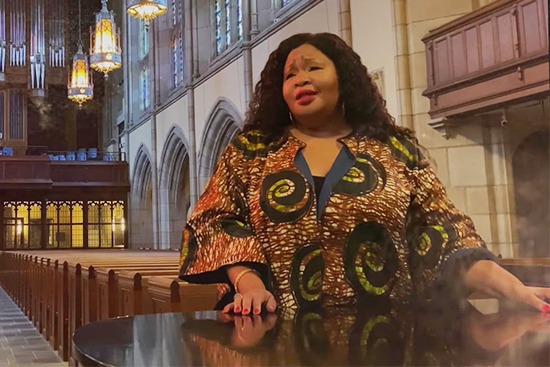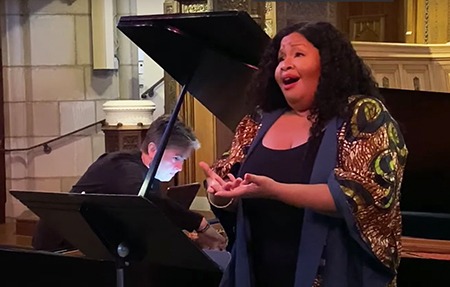Karen Slack (Opera ’02) Urges Viewers to #SayTheirNames


Karen Slack (Opera ’02) has long gained critical acclaim for her performances, including a recent recital for Opera Philadelphia with opera student Lindsey Reynolds (Voice ’20) and alumna Sarah Shafer (Opera ’14), but is now getting attention in the press with the release of her new film, #SayTheirNames, produced in partnership with Lyric Fest. The film combines poetry, artwork, and music—including a moving new piece by Jasmine Barnes in which Ms. Slack recites the names of Black women killed by police—to bring to life the struggles and successes of Sojourner Truth, Ida B. Wells, Fannie Lou Hamer, and Kimberlé Crenshaw.
“This film expresses how important Black women’s place in history is,” says Ms. Slack. “We often don’t get a chance to acknowledge their sheer resilience in having survived so much in this country. [Black women] were the catalyst for so many justice movements that moved the needle of equality for all people. We often think about the men of the civil rights movement, but rarely about Ida B. Wells or Fannie Lou Hamer.”
Heroic figures like those featured in #SayTheirNames have long inspired Ms. Slack’s advocacy of artists and women, especially women of color. In her research of poetry for the film, she remembers “the enlightenment I had as a woman. We have been pushed out of history and our contributions to the literary movement have gone largely ignored. [These poets] were kept from their rightful place.” She adds that in the field of opera, where she is often the only person of color in a cast, “My presence is a statement, even though it shouldn’t be.”
This multi-disciplinary project was a first for Ms. Slack, though she sees it at the next step of ideas she has been cultivating for a long time. Prior to the pandemic, she was involved in contemporary works and premieres of new operas, but she was seeing a trend in the roles available to her. “I’ve been frustrated by roles where I’m just someone’s mom, someone’s wife. These are full-blooded women who have their own stories; they have history.” She began to imagine her own musical productions, including recital projects, that tell more complete stories. “So when Lyric Fest came to me to see what I wanted to do, I immediately said we have to do #SayTheirNames. After George Floyd was murdered, there was an awakening in the world…I want to be part of the change. No one is going to give me the platform to talk about these things, until I create the moment and take it on.”
Ms. Slack had a clear arc and artistic vision for the piece, but she is quick to give a lot of credit to Lyric Fest’s founder and artistic director, Suzanne DuPlantis, “for translating my vision beautifully on to film,” she says. Together they selected the images that accompany the singing and narrations, including photographs of lynchings and video of Sandra Bland, who was beaten by police and found dead in her prison cell following her arrest in 2015. Far from being sensationalist, Ms. Slack hopes these depictions will educate viewers. “We are leaning into the hard images,” she affirms. “The lynchings were on post cards,” she says pointedly about the historic photography. In the film, “We don’t shy away from showing Black women being beaten in modern times. There’s no other way to explain [the violence they experienced]. And as Classical artists, we don’t get the chance to talk about these topics often enough.”
Please note: The video below contains some graphic imagery.
“I hope audiences come away with understanding, admiration, and respect for Black women. I don’t think we get the credit we deserve for being here and where we are in 2021.” Indeed, although Ms. Slack knew the stories of the four subjects, the film afforded her a deeper respect “for my ancestors and everyone before me, and their resilience to carry on in spite of this violence.” She also hopes the film will spark personal explorations. “I want people to walk away with a different view of history. To be curious enough to Google the names of these women to learn more about them, and then to see the other names that are attached to them, and Google those names, too.”
Plans are already in the works to grow #SayTheirNames once performance venues reopen, adding in new commissions and highlighting the women of the Black Lives Matter and Black trans movements. “I’d like this to be a live experience along with the film, so it’s on a whole other level,” says Ms. Slack. She especially hopes to incorporate dance and movement, which she feels are an important part of relating the true Black experience, and to “explore and expand the culture.” Primarily she wants to “be unapologetic about all of it.”
In addition to the subject matter, the creation and production of a film has had an impact on Ms. Slack. “It has empowered me to tell more of these stories. And to ask for things that I’ve always wanted to ask for but didn’t have the courage. It has inspired, enlightened, and empowered me,” she says, especially of her leadership skills. Notably, she is thinking more and more about producing, a role that never seemed so attainable. “Something in me was birthed. As a singer, I’ve always been telling other people’s stories. But when you create it, when it comes from inside of you out, that’s huge. So to see my name as a singer is great, yes, but to see creator, producer?!”
 Although Ms. Slack had long been excited about producing, she felt hampered by a lack of experience. But the events of 2020 underscored an urgency and opportunity to act now and learn new skills along the way. She feels grateful to the Curtis Opera Theatre “for creating the interesting, out-of-the box productions we performed.” Says Ms. Slack, who hopes to absorb as much as she can about all sides of the creative process, “Teaching that kind of thing is the future. Sometimes for musicians, if you want to eat, you must create your own work. You must. Conservatories like Curtis need to invest in that.”
Although Ms. Slack had long been excited about producing, she felt hampered by a lack of experience. But the events of 2020 underscored an urgency and opportunity to act now and learn new skills along the way. She feels grateful to the Curtis Opera Theatre “for creating the interesting, out-of-the box productions we performed.” Says Ms. Slack, who hopes to absorb as much as she can about all sides of the creative process, “Teaching that kind of thing is the future. Sometimes for musicians, if you want to eat, you must create your own work. You must. Conservatories like Curtis need to invest in that.”
As with many artists, she is optimistic that the pandemic has been a catalyst for creativity and introspection and has motivated many to do new and important work. She reminds her students that networking and creating among your peers is more important than ever. “Have hope and have faith and know that it’s a good thing that we won’t go back to business as usual [after the pandemic],” she says. Ms. Slack hopes that her own story will spark creativity, collaboration, and meaningful projects for others: “I hope that some students will read this, call their friends, and start creating!”


